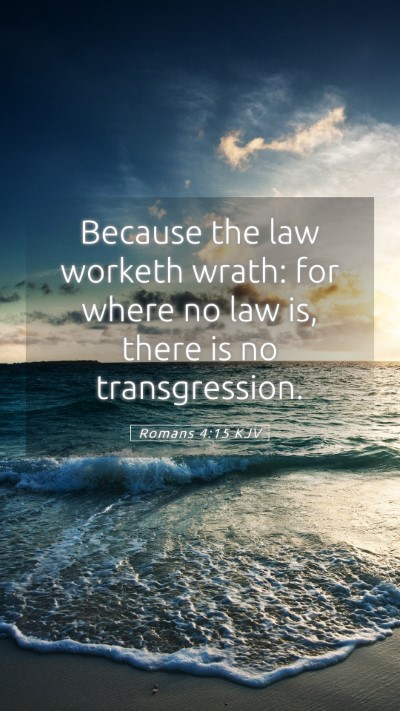Old Testament
Genesis Exodus Leviticus Numbers Deuteronomy Joshua Judges Ruth 1 Samuel 2 Samuel 1 Kings 2 Kings 1 Chronicles 2 Chronicles Ezra Nehemiah Esther Job Psalms Proverbs Ecclesiastes Song of Solomon Isaiah Jeremiah Lamentations Ezekiel Daniel Hosea Joel Amos Obadiah Jonah Micah Nahum Habakkuk Zephaniah Haggai Zechariah MalachiRomans 4:15 Meaning
What is the meaning of Romans 4:15?
Because the law worketh wrath: for where no law is, there is no transgression.
Romans 4:15 Bible Verse Meaning
Bible Verse Meaning: Romans 4:15
The verse Romans 4:15 states: "Because the law worketh wrath: for where no law is, there is no transgression." This verse is pivotal in understanding the relationship between the Law and sin, highlighting the direct consequences of living under the legalistic requirements of the Hebrew Scriptures.
Summary of Insights from Commentaries
-
Matthew Henry's Commentary:
Henry emphasizes that the law serves to expose sin rather than to provide a remedy for it. The presence of the law makes people aware of their transgressions, hence invoking God's wrath as a consequence of violation.
-
Albert Barnes' Notes:
Barnes explains that without the law, there would be no defined transgression. The existence of the law highlights our failures to adhere to God's commands, resulting in guilt and condemnation in the sight of God.
-
Adam Clarke’s Commentary:
Clarke discusses that the law leads to wrath because it establishes a standard that humans are unable to meet. He points out the importance of understanding the purpose of the law in relation to grace and faith, as the latter transcends the former.
Understanding the Context
The Apostle Paul, in this chapter, is addressing the Jews and Gentiles regarding the role of the Law. He argues that righteousness cannot be obtained through the law but by faith. This distinction is crucial for grasping the essence of salvation in the New Testament.
Key Themes
- Law and Sin: The primary theme in this verse is the relationship between the Law and the acknowledgment of sin.
- Faith vs. Works: Highlighting the contrast between legalistic observance of the Law and the necessity of faith for salvation.
- Divine Wrath: Understanding how God’s reaction to transgression is outlined through the existence of the Law.
Application in Daily Life
This verse challenges believers to reflect on their standing before God not based on their adherence to the Law but on their faith in Christ. It raises questions about how one can live a life justified through faith rather than pursuing self-righteousness through legalistic practices.
Cross References
- Galatians 2:16 - Emphasizes justification by faith and not by the works of the Law.
- Romans 3:20 - Suggests that through the Law comes the knowledge of sin.
- James 2:10 - Teaches that failing in one point of the law makes one guilty of all.
Conclusion
Romans 4:15 serves as a crucial reminder of the limitations of the Law and the sufficiency of faith in Christ for salvation. It reveals the importance of understanding not just the words of Scripture but their implications for our spiritual lives.
Additional Resources for Bible Study
Engaging with Bible study groups, utilizing online Bible study tools, and exploring various Bible study guides can enhance your understanding and interpretation of Scripture.


